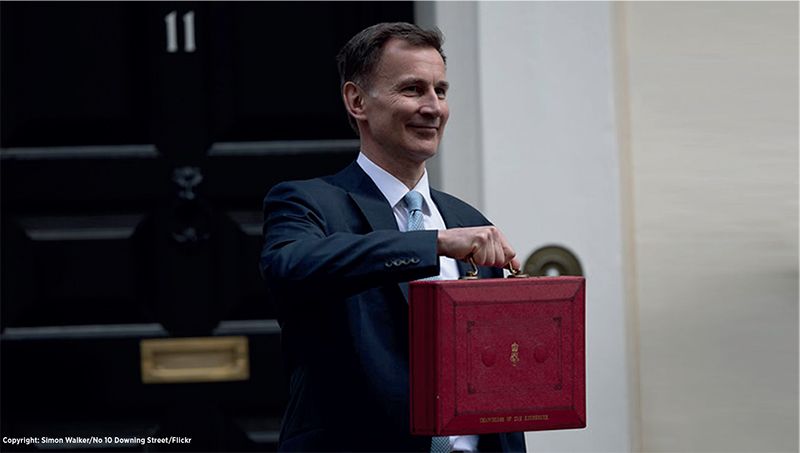More funding for green industries and energy, continuing the freeze on fuel duty and extending the corporate windfall tax were among the major announcements by the UK chancellor, Jeremy Hunt, at the Spring Budget.
In a budget low on ‘rabbit-from-hat’ moments, the chancellor made time to jibe the Labour Party, adding that national debt should be at its lowest since 2001 by the end of the current set of forecasts – something he said would not have been possible with Labour’s now dropped £28bn green pledge. However, commentators were quick to point out the continued confusion over where the UK stands on its green transition pledges, given recent regulatory walkbacks.
Below, PA Future outlines a list of the most pertinent sustainability points from the Spring Budget.
FCA to regulate ESG ratings providers
Announced in the supporting documentation, the government will regulate providers of Environmental, Social and Governance (ESG) ratings to users within the UK, with ESG ratings providers brought into the regulatory perimeter of the Financial Conduct Authority (FCA). Last year, the government published a consultation on the proposal.
This follows a similar move agreed by the European Council and European Parliament earlier this year, which states that ESG rating providers will need to pay to be authorised and supervised by the European Securities and Markets Authority to ensure they meet requirements.
Funding for green industries and energy
The chancellor also announced £120m of support for the government’s Green Industries Growth Accelerator, while a further combined £270m is earmarked for advanced manufacturing industries developing vehicle and space innovation, to grow “zero emission vehicle and clean aviation technology”.
James Alexander, CEO of the UK Sustainable Investment and Finance Association, said: “UKSIF is delighted to hear of £200m in planned government investment into the development of net-zero aviation. This is an area where the UK has immense domestic expertise and resources, and so is in prime position to establish itself as a leader, and in doing so to attract billions in private investment.
“We also welcome the £73m in government funding to support the development of electric vehicle technology. This goes some way to reassuring investors that the UK is serious about becoming a global leader in the drive towards a sustainable economy.”
Th accompanying document also notes confirmation of £1bn in ‘Contracts for Difference’ funding for low-carbon power; a “significant step in the right direction”, given last year’s failure to attract any bids from offshore wind developers, according to Sam Hollister, head of energy economics and finance at LCP Delta.
“The government will hope that this budget, larger than any previous budget, will be enough to deliver sufficient offshore wind investment to meet the government’s 50 gigawatt (GW) target by 2030, and we expect the £800m dedicated to offshore wind could likely procure as much as six GW in the upcoming auction,” Hollister continued.
“This is certainly a welcome development given last year’s failed auction. However, it may not be enough to get the UK back on track with time running out to build the additional 23 GW needed by 2030.”
Continuing the freeze on fuel duty rates
Elsewhere, fuel duty is set to remain at its current rate and be frozen for the next 12 months. The 5p cut on fuel duty also remains, having been due to end this month.
Gemma Woodward, head of responsible investment at Quilter Cheviot, said that no Conservative chancellor “has dared get on the wrong side of motorists” by announcing they’ll hike the duty. But, if the government is serious about reaching net zero by 2050 and is serious about incentivising the switch to electric vehicles, then “they’ll need to take a long hard look at the taxes on motoring” and “fuel duty freezes are unlikely to help encourage people to make the switch”.
“There’s also the question of how the government intends on plugging the impending fiscal hole once electric vehicles become more and more popular,” she added.
“Vehicle excise duties are levied on CO2 emissions, meaning electric vehicle drivers do not pay any tax. Gradually, as more and more people adopt electric vehicles, the government’s tax receipts from vehicle excise duties will reduce substantially. That said, the government has failed to build the infrastructure to support widespread adoption of electric vehicles.
“Increasing vehicle excise duties on electric vehicles could well be the answer, but this risks stunting demand for these cars at such a crucial time. Another solution would be for the government to introduce a pay-per-mile tax scheme, which would see drivers pay tax on every mile travelled with potential incentives on offer for drivers of electric vehicles, but this is going to be quite complex to implement.”
Corporate windfall tax extended
Hunt also said that he will extend the UK’s windfall tax on the profits of oil and gas companies until 2029 “to raise a further £1.5bn” for the UK economy, as high energy prices caused by the war in Ukraine are expected to continue.
Nuclear power
Despite remaining a controversial topic, the government are also doubling down on their nuclear power strategy. The chancellor said he wanted to see nuclear power “represent one quarter of our electricity by 2050”.
Great British Nuclear, the government’s long-term nuclear programme, will begin the next phase of its Small Modular Reactor selection process, with companies given until June to submit their initial tender responses. Hunt also confirmed the purchase of the Wylfa site on Anglesey as part of the government’s drive to construct the next generation of nuclear power stations.
Seb Beloe, partner and head of research at WHEB Asset Management said that support for nuclear is “expensive”, given that the price per megawatt hour for new nuclear could be more than £90, while also being linked to inflationary pressure. In contrast, offshore wind is capped at £73.
“Offshore wind has the drawback of being intermittent – though much less so than onshore wind and solar. Nuclear however is very inflexible. We are far from convinced that the expensive, inflexible power offered by nuclear is the best solution for the UK’s grid.”








